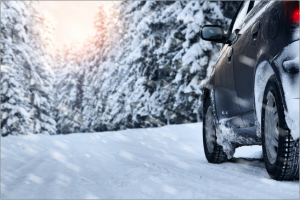Staying Safe on the Road During the Holidays

The holidays are approaching quickly, and soon millions of Americans will be taking to the roads to visit family, go shopping and travel back home. With the increased traffic and the natural dangers that come with winter weather, traffic incidents are known to increase during the holidays, causing potentially serious personal injuries or even fatalities. Even those who drive carefully can be at risk due to the negligence of others or the conditions of Mother Nature.
However, understanding and utilizing basic strategies for safe winter driving can greatly reduce the chances you or your family will be among those unfortunate souls who are involved in accidents during the holidays. While there will always be some level of risk any time you take to the road, you can should still learn and take the necessary steps to increase safety and reduce the chances of an accident.
Holiday Hazards
The holiday season is a wonderful time for celebration and cherishing time with loved ones, and many people must travel a great distance to do so. This causes increased traffic along the roads, which in turn increases the chances of incidents. But even with more cars on the road, there are other dangers of holiday driving which could be more serious and hazardous.
Driving in winter weather is unlike driving the rest of the year, and this season brings more natural hazards along the roads. In addition to snow and sleet, icy roads can be particularly dangerous, especially to those who are inexperienced or uneducated in driving on them. While the safest solution is to simply stay home, this is not always a realistic option, and many families will still hazard the roadways, even in serious conditions.
The holidays also see an increase in impaired driving incidents, since many Americans include alcohol in their holiday celebrations. While there is nothing wrong with sharing a drink with friends or family during the season, there is no excuse for getting behind the wheel afterwards. Unfortunately, many careless people will do so anyway.
Although these dangers may be outside of your control, you can take steps to prepare for and deal with them before you and your family hit the road this holiday season. With proper understanding and utilization of safe winter driving strategies, you can greatly reduce your chances of an accident and ensure you reach your holiday destination safely.
Safe Winter Driving
In addition to traditional safe driving strategies that you employ year-round, the following techniques will help you avoid the dangers of winter, prepare for potential incidents and adjust to winter road conditions.
1. Regularly check to ensure your tires are properly inflated.
2. Keep windshield washer fluid full and maintain good wiper blades on your car.
3. Avoid using your parking brake in winter weather conditions.
4. Do not use cruise control on wet or frozen roads.
5. Do not drive if you are fatigued, as this is one of the leading causes of accidents year-round.
6. Keep your gas tank at least half-full at all times in winter weather.
7. Be especially cautious along bridges, overpasses and other roads that are prone to freezing.
8. While it is important to stay up-to-date on weather conditions, NEVER check weather (or anything else) on your phone while driving.
9. Remember that speed limits are intended for normal conditions, and you should drive more slowly in inclement weather.
10. Keep a winter weather emergency kit in your car in case of an incident. Your kit should include:
- Ice scraper
- Snow shovel
- Salt for melting snow/ice
- Blanket
- Gloves and warm hat
- Drinking water
Before Embarking
In addition to the tips listed above, there are certain steps you should take before embarking on a winter road trip or long journey this holiday season.
1. Have your car inspected by a professional auto mechanic.
2. Get your oil changed and have any other scheduled maintenance done before leaving, even if it is slightly early.
3. Regularly check weather and news reports in the days and hours leading up to your trip.
4. Plan your route well in advance. Although time and distance will be concerns, safety should be the main consideration in route planning.
5. Make sure friends and family know about your destination, route and expected time of arrival.
6. Fully charge your phone before leaving. Make sure everyone else in the family does the same.
7. Know how to properly utilize your breaks in hazardous conditions.
8. If weather is expected to be severe, simply stay home. Delaying your trip may cause an inconvenience, but it is better than putting yourself and your family at risk.

